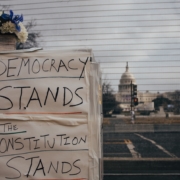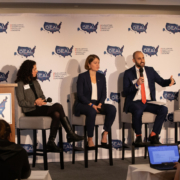For Immediate Release:
February 10, 2022
Contact: Jonathon Dworkin, 202-660-1340 x5, jonathon@newdealleaders.org
NewDEAL Forum Publishes Model Solutions to Improve Broadband Access
Broadband Task Force report provides guidance for state and local policymakers to use federal funds to close the digital divide
Washington, DC – Recognizing broadband access as an essential tool for work, school, healthcare, and more, the NewDEAL Forum today released a report highlighting promising policy solutions to increase access to high-speed internet and provide support for individuals and families to achieve their potential in today’s economy. In Bridging the Digital Divide: Policy Proposals to Increase Broadband Access for All, the Forum’s Broadband Task Force calls for state and local policymakers to:
- Improve mapping and data collection;
- Build new broadband networks in unserved and underserved communities;
- Innovate to address affordability and adoption;
- Enhance digital skills; and
- Increase access to telehealth
The COVID-19 pandemic has spotlighted the consequences of the digital divide, with millions of Americans struggling to remain connected to school, services, and work. An unprecedented infusion of federal funding from the American Rescue Plan and Bipartisan Infrastructure Law to address broadband provides states and localities an extraordinary opportunity to make targeted investments to close this divide. Co-chaired by Michigan Lt. Governor Garlin Gilchrist, Florida Senator Loranne Ausley, and San Jose Mayor Sam Liccardo, the Task Force has issued its new report to spotlight case studies from states, counties, and cities that are making progress in overcoming barriers to provide reliable broadband to residents.
“The pandemic revealed more clearly than ever that far too many people lack broadband access, and that lack of access exacerbates the systemic racial and economic gaps we see in other areas,” write Gilchrist, Ausley, and Liccardo in the report’s introduction. “We learned how incomplete and inaccurate our connectivity maps have been and how we have misunderstood the problem. But now we’re learning how we can properly evaluate gaps in high-quality internet access and make targeted investments to address them at the federal, state, and local levels.”
View the full recommendations here.
A key theme of the report is the inequitable nature of the digital divide, recognizing that inadequate broadband disproportionately impacts people of color. The model initiatives and policy recommendations included by the Task Force would specifically address the needs of these communities.
Launched in mid-2021, the Task Force has brought together elected officials across the country who are leading efforts in their communities, as well as policy experts and private and non-profit organizations. The group has been active in national policy discussions, sending a letter to the Treasury to press for the expanded use of American Rescue Plan funding for more broadband projects, and advocating for more accurate maps of where high-speed internet access currently exists.
“We are grateful to all of the participants who helped us understand the key challenges our country faces, offered guidance, and shared best practices” said the Task Force Co-chairs. “The initiatives outlined here provide a blueprint for how other states and cities can tackle their broadband needs and inequities with new federal funds.”
The Policy Group now moves into a phase of working toward implementation of these recommendations across the country, including by engaging with the Forum’s sister organization, the NewDEAL — a network of 200 of the most innovative state and local officials across the country, including Gilchrist, Ausley, and Liccardo, who are chosen for their forward-thinking, results-driven approach to governing.
“The work of our co-chairs and partner organizations has provided a platform for leaders and organizations to promote some of the most promising work taking place across the country,” said Debbie Cox Bultan, CEO of the NewDEAL Forum. “With unprecedented bipartisan political will and infusion of federal funding as a result of the pandemic, we cannot miss this moment to get all Americans online, and it will be up to state and local leaders to implement initiatives that will close the digital divide once and for all.”
“The COVID-19 pandemic has shined a light on the critical need for equitable broadband access in the United States,” said New Democrat Coalition Chair Suzan DelBene (WA-01). “That’s why the New Democrat Coalition fought for and secured $65 billion in the Bipartisan Infrastructure Law to improve our nation’s broadband infrastructure and help Americans access this essential 21st century tool. Across federal, state, and local levels of government, officials are showing good governance can work by coming together to implement this crucial funding and bridge the digital divide.”
About the NewDEAL Forum
The NewDEAL Forum is a non-profit organization which identifies and promotes innovative, future-oriented state and local pro-growth progressive policies that can improve the lives of all Americans. By facilitating the identification and spread of policy ideas, the NewDEAL Forum seeks to foster economic growth, reduce barriers to opportunity and promote good government in communities and states. The Forum advances its mission by researching, identifying, and sharing state and local pro-growth progressive policy ideas and bringing together public, private, and non-profit sector policy experts to exchange ideas and discuss the country’s biggest challenges.
###













